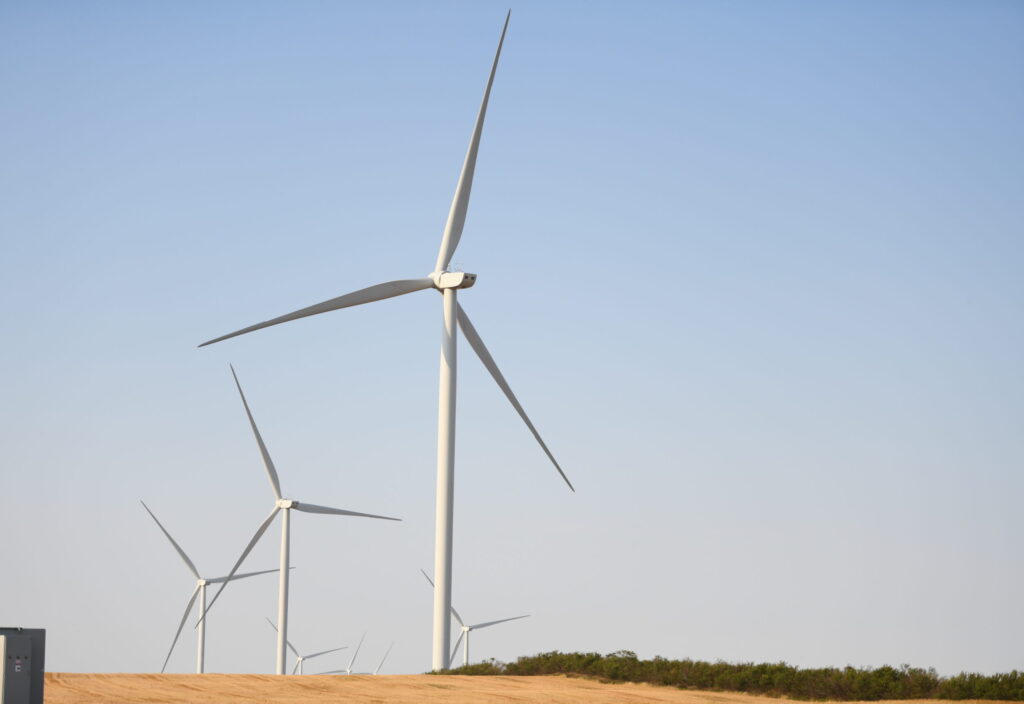Brian Zinchuk is editor and owner of Pipeline Online

Golden South Wind Farm, southeast of Assiniboia, on Aug. 1, 2022. On that day it was quite windy, unlike Oct. 3 and 4. Photo by Brian Zinchuk.
REGINA – There are some days where the wind simply doesn’t blow. And there are some days where it does, and pretty hard, at that.
Oct. 23 was one of those days.
According to SaskPower’s daily webpage update of “Where your power comes from?” on Sunday, Oct. 23, wind power was contributing one of its highest, if not the highest, outputs yet posted since the page went live on Sept. 21. It’s a web page Premier Scott Moe encouraged Saskatchewan people to check out on a regular basis, according to an interview with him on Oct. 11.
On Oct. 23, SaskPower saw an average of 518 megawatts generated over a 24 hour period. Most of the last month that number has been between an average of 150 and 300 megawatts per day.
That 518 megawatts is out of a total nameplate capacity of 617 megawatts. The total average power output was 84 per cent of nameplate capacity. But again, that’s an average – meaning the output varied both higher and lower throughout the day.
According to SaskPower spokesperson Joel Cherry via email on Oct. 25, “(It) turns out our peak wind on Oct 23 was 580 megawatts, which is indeed very high – I am not sure yet whether it’s a record.”
That would mean the eight grid-scale wind farms totalling 617 megawatts across the province peaked at 94 per cent capacity. Usually it is nowhere near that number.
Throughout the day, wind contributed 19 per cent of total generation. Hydro was 10 per cent, or an average of 288 megawatts. Grid-scale solar was negligible, not even showing up on the graph as either a percentage or even an average of a single megawatt (there’s 20 megawatts installed grid-scale solar in Saskatchewan, not counting smaller facilities).
Natural gas generated an average of 1,040 megawatts, or 38 per cent. Coal was 27 per cent of total generation, or an average of 738 megawatts. “Other,” which includes small independent power producers like flare gas, waste heat recovery, landfill gas, and small-scale solar, came in at an average of 167 megawatts, or six per cent overall.
Asked if coal and natural gas had been scaled back to allow for the additional wind that day, Cherry responded, “We ramp down our fossil fuel generation when more wind is available. The grid is actually pretty nimble when it comes to accommodating changes in available intermittent power such as wind.”
- 0111 2026 SK Oil Show booth promo 010111 2026 SK Oil Show booth promo 01
- 0085 Turnbull snow removal call office0085 Turnbull snow removal call office
- 0110 SaskEnergy SEI_Network_Members_Burn_Brighter0110 SaskEnergy SEI_Network_Members_Burn_Brighter
- 0109 SaskPower SASPO_2817_PLT_Recruitment_DIVERSITY0109 SaskPower SASPO_2817_PLT_Recruitment_DIVERSITY
- 0105 SaskEnergy Commitment to Safety0105 SaskEnergy Commitment to Safety
- 0102 Lori Carr Coal Extended0102 Lori Carr Coal Extended
- 0100 Turnbull Project Manager0100 Turnbull Project Manager
- 0099 Mryglod Steel 1080p0099 Mryglod Steel 1080p
- 0097 Eagle Sky Ventures LTD0097 Eagle Sky Ventures LTD
- 0095 Fast Trucking nearly 70 years good at it0095 Fast Trucking nearly 70 years good at it
- 0092 Turnbull projects big and small0092 Turnbull projects big and small
- 0046 City of Estevan This is Estevan Teaser0046 City of Estevan This is Estevan Teaser
- 0077 Caprice Resources Stand Up For Free Speech0077 Caprice Resources Stand Up For Free Speech
- 0061 SIMSA 2024 For Sask Buy Sask0061 SIMSA 2024 For Sask Buy Sask
- 0051 JML Hiring Pumpjack assembly0051 JML Hiring Pumpjack assembly
- 0049 Scotsburn Dental soft guitar0049 Scotsburn Dental soft guitar
- 0041 DEEP Since 2018 now we are going to build0041 DEEP Since 2018 now we are going to build
- 0032 IWS Summer hiring rock trailer music
- 0022 Grimes winter hiring
- 0021 OSY Rentals S8 Promo
- 0018 IWS Hiring Royal Summer
- 0013 Panther Drilling PO ad 03 top drive rigs
- 0002 gilliss casing services0002 gilliss casing services
- 9002 Pipeline Online 30 sec EBEX9002 Pipeline Online 30 sec EBEX
- 9001
